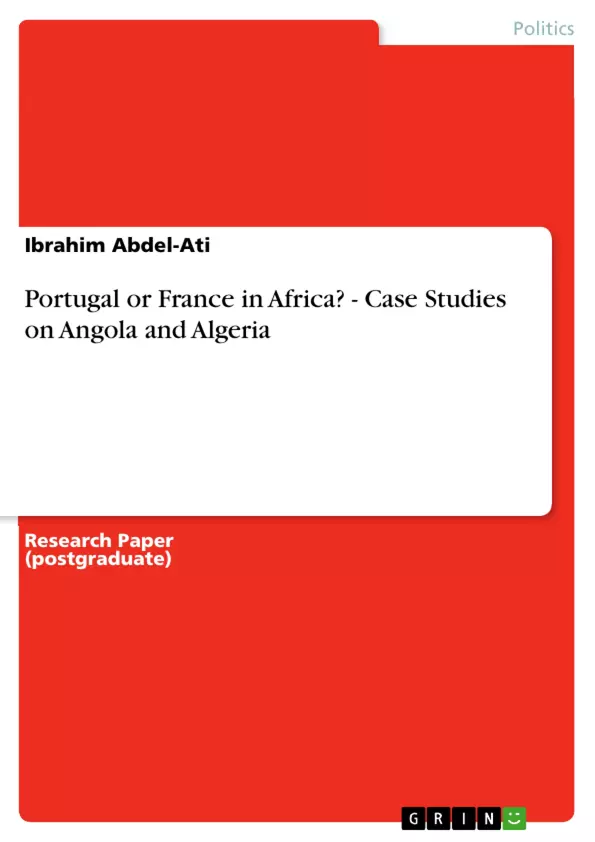One of the main characteristics of Africa is European colonization, that affected all African nations, except Ethiopia. The European nations divided the African continent among themselves, into different colonies. In each colony, the colonizer imposed different rules, ideas and ideologies. As a result, studying how different colonizers performed in their different colonies is important and interesting. Another main characteristic is the degrading economic situation of the African states. The economic performance of the African states is known to be among the worst in the world, with very low annual growth and annual gross domestic product (GDP).
This paper is designed to study two African countries, Algeria and Angola, which were colonized by two different colonizers, France and Portugal respectively, in order to understand the various kinds of impact that different colonizers had on their former African colonies.
Table of Contents
- Introduction
- Part One: The Independence
- Part Two: The International Relations with the Former Colonizers
- Part Three: The International Relations with the Superpowers
- Part Four: The Economic Performance
Objectives and Key Themes
This paper aims to compare the experiences of Algeria and Angola, two African countries colonized by France and Portugal respectively, to understand the diverse impacts of different colonizers on their former colonies. The comparison focuses on the independence processes, post-colonial relationships with former colonizers, interactions with superpowers, and the economic performance of both nations.
- The impact of different colonial powers on their African colonies.
- The processes of independence in Algeria and Angola.
- Post-colonial relationships between the newly independent states and their former colonizers.
- The role of superpowers in the politics of Algeria and Angola.
- A comparative analysis of the economic situations in Algeria and Angola.
Chapter Summaries
Part One: The Independence: This section contrasts the independence processes of Algeria and Angola. Algeria's struggle involved significant resistance against French rule, lasting from 1830 to 1962, marked by the emergence of the Front de Liberation Nationale (FLN) and a prolonged war. The French initially treated Algeria as an integral part of France, yet denied Algerians full citizenship. In contrast, Portugal's colonization of Angola began earlier (1445) and lasted much longer, highlighting fundamentally different colonial experiences and paths to independence. The French experience showcases a prolonged war driven by nationalistic movements, while the Angolan experience points toward a different kind of protracted colonial relationship and delayed independence.
Keywords
Algeria, Angola, French colonialism, Portuguese colonialism, independence, decolonization, post-colonial relations, superpowers, economic performance, comparative analysis, FLN, Evian Accords.
Frequently Asked Questions: A Comparative Study of Algeria and Angola
What is the main focus of this study?
This study compares the experiences of Algeria and Angola, two African countries with distinct colonial histories (French and Portuguese respectively), to understand how different colonizers impacted their former colonies. The comparison focuses on independence processes, post-colonial relations with former colonizers, interactions with superpowers, and economic performance.
What are the key themes explored in this study?
Key themes include the impact of different colonial powers on their African colonies; the processes of independence in Algeria and Angola; post-colonial relationships between newly independent states and their former colonizers; the role of superpowers in the politics of Algeria and Angola; and a comparative analysis of the economic situations in Algeria and Angola.
How does the study contrast the independence processes of Algeria and Angola?
Algeria's independence struggle involved significant resistance against French rule (1830-1962), marked by the FLN and a prolonged war. France initially treated Algeria as an integral part of France, denying Algerians full citizenship. Angola's colonization by Portugal began earlier (1445) and lasted much longer, resulting in fundamentally different colonial experiences and paths to independence. The Algerian experience highlights a prolonged war driven by nationalistic movements, while the Angolan experience points towards a different kind of protracted colonial relationship and delayed independence.
What topics are covered in each part of the study?
The study is divided into four parts: Part One covers the independence processes of Algeria and Angola; Part Two focuses on post-colonial relations with former colonizers; Part Three examines interactions with superpowers; and Part Four analyzes the economic performance of both nations.
What keywords are associated with this study?
Keywords include: Algeria, Angola, French colonialism, Portuguese colonialism, independence, decolonization, post-colonial relations, superpowers, economic performance, comparative analysis, FLN, Evian Accords.
What is the overall objective of this research?
The paper aims to provide a comparative analysis of the experiences of Algeria and Angola after independence, highlighting the lasting effects of their distinct colonial pasts and their subsequent interactions with global powers.
Where can I find a detailed breakdown of the study's content?
The provided document includes a table of contents, chapter summaries, objectives and key themes, and keywords, offering a comprehensive preview of the study's content.
- Citation du texte
- Ibrahim Abdel-Ati (Auteur), 2006, Portugal or France in Africa? - Case Studies on Angola and Algeria, Munich, GRIN Verlag, https://www.grin.com/document/85074



